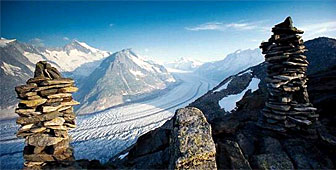
High hopes for mountain conference

Experts from the world's mountain regions have gathered in Switzerland to discuss sustainable development as part of the UN Year of Mountains.
The five-day conference in Adelboden in the Bernese Oberland is preparing a strategy for the Alps, which will be presented to the World Summit on Sustainable Development in Johannesburg, South Africa later this year.
Participants will have an opportunity to discuss the progress made in the ten years since the Rio Earth Summit.
“Sustainable development in the Alps is a fairly recent expression,” said Isabella Bustelli of the Swiss branch of the Worldwide Fund for Nature. “Compared with other countries, the Swiss tend to be more aware of these issues but the problem is always one of putting ideas into practice. It takes time for people to come to terms with environmental issues.”
Swiss commitment
Switzerland hopes to make its own experience and commitment work in favour of sustainable development in mountain regions. This commitment began with a substantial contribution to the text of chapter 13 of Agenda 21, the document adopted by the Rio Earth Summit.
It has also led to 120 projects, sponsored by the Swiss Development Agency, in mountain regions around the world.
In Switzerland, there is a centuries-old tradition of prudent management of Alpine meadows and forests where farmers and foresters have tried to use methods suited to the local conditions.
The Swiss forest management regime, adopted in the 19th century, for example, only allows the cutting of trees that can be replaced.
“The Alps are a very precious resource,” explained Isabella Bustelli. “You need only think of water. The key question, then, is how to use, how to exploit these resources, while ensuring that we leave them intact for future generations. We cannot afford to think only of the short term.”
Balancing opposing interests
The challenge for the Alps today is to strike a balance between opposing interests such as tourism, transit traffic, agriculture and animal husbandry.
UN Secretary General Kofi Annan made this point when he inaugurated the International Year of Mountains on 11 December last year in New York.
“The environment in mountain regions is facing ever-increasing threats,” he said. “The price to be paid is high, both socially and economically. Striking a balance between development and protection of the environment is now a matter of urgency.”
Finding a way of balancing opposing interests is one of the objectives of the conference in Adelboden.
During this year devoted by the UN to mountains and eco-tourism, it is an opportunity to exchange information on agriculture in mountain regions and consider challenges, concerns and experiences.
A strategy for Johannesburg
Sustainable agriculture and regional development in mountain areas are key aspects of chapters 13 and 14 of Agenda 21, a document adopted in Rio de Janeiro in June 1992 during the United Nations sponsored conference on the environment and development.
The conference in Adelboden is organised by the Federal Office for Agriculture together with the United Nations Food and Agriculture Organisation.
It is laying the groundwork for the World Summit on Sustainable Development, which is due to be held in Johannesburg, South Africa, from August 26 to September 4.
Though they are home to only one tenth of the world’s population, mountains and highlands account for roughly one quarter of the earth’s surface. They supply almost half of mankind’s fresh water, and are a treasure store of biodiversity.
Fifty-three countries are regarded as “mountainous” – that is to say, mountains occupy more than half of their land area. Switzerland comes in the top 15, with mountains accounting for over three quarters of its territory.
Sergio Regazzoni / swissinfo

In compliance with the JTI standards
More: SWI swissinfo.ch certified by the Journalism Trust Initiative




























You can find an overview of ongoing debates with our journalists here . Please join us!
If you want to start a conversation about a topic raised in this article or want to report factual errors, email us at english@swissinfo.ch.